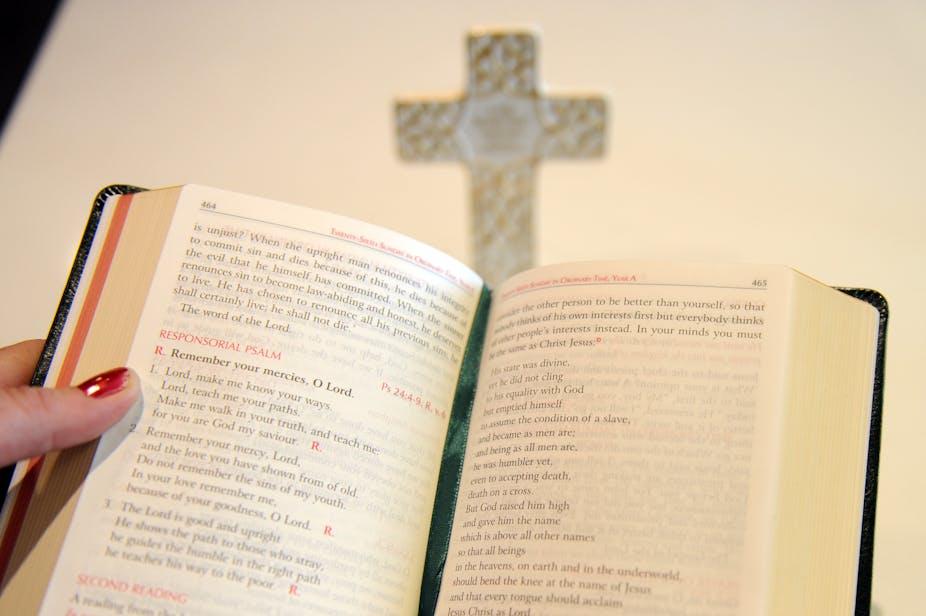Despite recent calls for its elimination and the High Court (again) finding that it was funded unconstitutionally, the Abbott government announced this week that it would continue its school chaplaincy program by funnelling money to the states.
However, debate about the school chaplaincy program has missed the mark. It has been informed by deficient understandings of what “secular” means, both in general and in the Australian context.
Dictionary understanding of ‘secular’
The school chaplaincy program for “secular” schools was established in 2006 by the then-Coalition government. It originally provided funding only for religiously affiliated chaplains. The subsequent Labor government expanded the scheme in 2011 to include funding for non-religious social workers.
Previously, schools were only able to employ non-religious counsellors under the program if they demonstrated that efforts to find an ordained chaplain had failed. However, in May this year, the current Coalition government restricted funding to religious chaplains.
Newspaper articles reporting on Labor’s expansion of the scheme in 2011 used the term “secular” in the dictionary sense of “non-religious”. An article published this week on the government’s “religious-only” stance on school chaplaincy was entitled:
Tony Abbott to keep secular workers out of school chaplaincy program.
It referred to non-religious counsellors in the chaplaincy program as:
… secular welfare workers.
Non-religious welfare officers and youth workers in the chaplaincy program have been widely described in the media as “secular workers”. The term “secular” in this sense has been used repeatedly by journalists and non-religious and religious commentators on the school chaplaincy debate.
Common understanding of ‘secular’
A recent article in The Conversation about religion in Australian schools posed the question:
What does “secular” mean?
The authors pointed out, quite rightly, that:
The commonly understood meaning of “secular” … [is] the separation of church and state.
Yet this understanding of “secular” overlooks the fact that over the past decade leading thinkers such as philosopher Charles Taylor and anthropologist Talal Asad have challenged commonly held assumptions about the “secular”.
Taylor argues, phenomenologically, that “secular” means an age or epoch in which religious faith “is one human possibility among others”. In other words, religious faiths and non-religious worldviews are “possibilities” that co-exist within the secular.
Phenomenological understanding of ‘secular’
This is not the case in France, where laïcité prohibits the wearing of conspicuous religious apparel, such as large crucifixes, Jewish skull caps and Islamic headscarves in state schools.
However, Taylor’s definition is precisely what has always constituted Australian secularism. The dictionary and commonly understood meanings of “secular” that inform recent debate about school chaplaincy seem sadly oblivious of this fact.
From the standpoint of lived experience in Australian society, Australian secularism includes as its most fundamental and precious value the freedom of citizens to be non-religious or religious, and the freedom to co-exist and engage democratically with others who have very different worldviews from one’s own.
Recovering the understanding of “secular” as an inclusive term is vital for creating an environment that is not exclusionary of those who have religious faith or those who don’t – but, rather, as an environment that encourages the participation of diverse perspectives.
Australian secularism and inclusive democracy
A school chaplaincy program that excludes funding for welfare officers on the grounds that they are non-religious does not count as “secular”. Such a “non-secular” scheme fosters undemocratic, closed-minded attitudes and painful antagonisms between people with very different worldviews within Australian society.
By the same token, the implementation in state schools of a school chaplaincy program that is “secular” – in the sense of being open towards funding either a religious chaplain or a non-religious counsellor – is crucial for promoting democratic attitudes of openness towards difference on the part of both non-religious and religious students, and in Australia as a whole.
Social conditions necessary for exercising democratic freedoms don’t just materialise out of thin air; they need to be created. If non-religious and religious Australians are to collaborate together in fostering social conditions that can reinvigorate a democratic way of life, then the Australian lived experience of secularism needs to be cherished.

